Ball Launcher—2018 Engineering Challenge Results
Launch the Ball Far—Then Catch It
The 2018 competition is over, but you can still try this challenge for fun! Can you build a ball launcher and a receiver to successfully throw and catch? How far apart can you set the launcher and receiver and still make a catch?
Full details, including the building, testing, and scoring procedures, can be found in these formats:
Congratulations to All Participants
More than 3,800 students from 10 countries participated in the 2018 Science Buddies Engineering Challenge, sponsored by Fluor Corporation. Challenged to create a ball launcher and receiver using everyday materials (like cups, pencils, ruler, tape, rubber bands, and paper), students devised and tested innovative solutions and launcher designs. After successfully creating a simple machine to launch a small ball made from aluminum foil, many students continued to test and modify their designs to try for successful catches with even greater launch distances. More than 1,390 teams submitted entries for the 2018 Engineering Challenge.
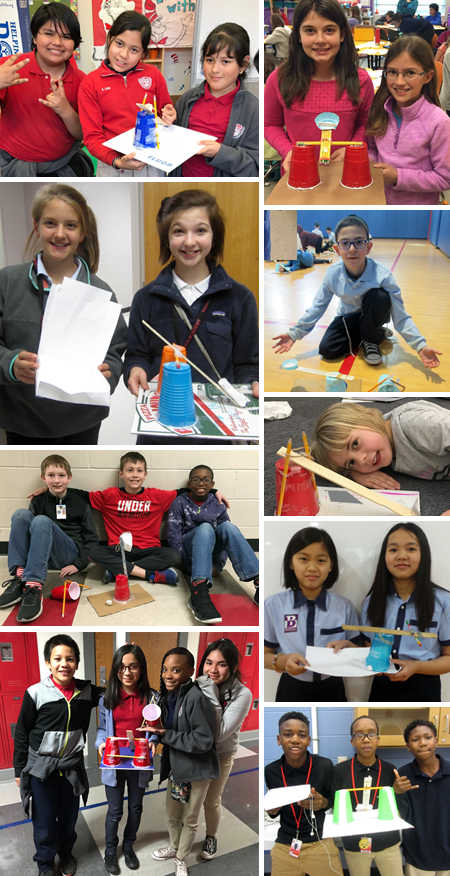
Figure 1. A few of the teams who submitted Ball Launcher solutions for the 2018 Engineering Challenge
Drawing Winners
All eligible team entries were placed into random prize drawings based on geographic location. Congratulations to the ten winning teams listed in Table 1 whose names were drawn from the eligible pools! Each of these teams earned $1,000 USD from Fluor Corporation for their school, organization, or afterschool program.
| Team | School / Program |
|---|---|
| Houston, TX | |
| Third Ward | Kempner High School |
| Greenville, SC | |
| Newton's 4 Launchers | Monarch Elementary School |
| Orange County, CA | |
| Team Hi | Joseph Perry Elementary School |
| Calgary, Alberta | |
| The Hamsters | Chinook Council Scouts |
| United States (including Puerto Rico) | |
| The Long Boomers | LaGrange Elementary |
| Survivors | Jemison Intermediate School |
| Survivors | Rio Vista Elementary |
| International | |
| Catapult Supernova | Philippine Christian School of Tomorrow |
| Space Potatoes | Glenwood Elementary |
| Super Cats | Academie de la Capitale |
Top Ten Scores Overall
The 2018 Science Buddies Engineering Challenge was open to students in grades K-12. The top 10 scores, overall, are shown in Table 2. All scores were validated by Science Buddies staff based on submission photos, the Challenge rules, and follow-up with teams, as necessary. Regardless of score, all entries that met the geographic requirements were entered in the random drawings.
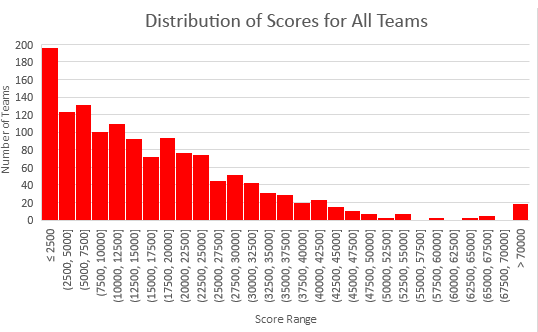
"My favorite part was the teamwork part, because I got to work with other smart minds to put a good working launcher together. The ideas we came up with to create a working launcher were great!"
(Team KWK)
| Top Ball Launcher Solution Scores | ||
|---|---|---|
| Team | Age (average) |
Score |
| Catapultimate | 12 | 134,464 |
| Students of Leonardo da Vinci | 12 | 106,325 |
| The Pencils | 14 | 89,720 |
| Explorers | 14 | 87,480 |
| Razorbacks | 12 | 84,250 |
| Coy and Carlo | 17 | 83,250 |
| Srijan | 14 | 77720 |
| Science Nerds | 11 | 77650 |
| She Wolves | 11 | 77290 |
| DAAD | 14 | 76770 |
Top Scores by Age
Students entering the 2018 Science Buddies Engineering Challenge worked in teams of up to four students. To recognize the hard work students did creating and testing their solutions and to give students a better sense of how their solutions and scores compare to other students of similar age, the tables and graphs below show the top scores and score distribution for submissions from ages 6-10, 11-14, and 15-18. (Note: The age used for each team is the average age of all members on the team.)
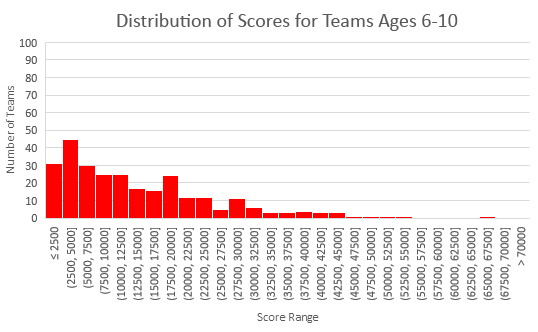
"The kids absolutely loved the challenge of discovering ways to not only launch further, but how to make their launches more accurate. As a teacher, I loved how each team had to discover what items to use and perform multiple trials to be successful."
(Teacher, Visual and Performing Arts Magnet School)
| Top Ball Launcher Solution Scores—Ages 6-10 | ||
|---|---|---|
| Team | School/Program | Score |
| Flying Solo | Homeschool | 66,475 |
| The Web | Glenwood Elementary | 53,430 |
| RTL | Brainworks International School | 51,435 |
| Big Bang | Philippine Christian School of Tomorrow | 49,870 |
| The Launcher Boys | SCOPES Academy at Unioto Elementary | 46,370 |
| Firebolt | Rio Vista Elementary | 44,640 |
| Amazing Launcher | Philippine Christian School of Tomorrow | 42,570 |
| M&M | St Michael's School | 42,000 |
| 3D Sparkle | SCOPES Academy at Unioto Elementary | 40,745 |
| Fast 4 | Rio Vista Elementary | 39,580 |
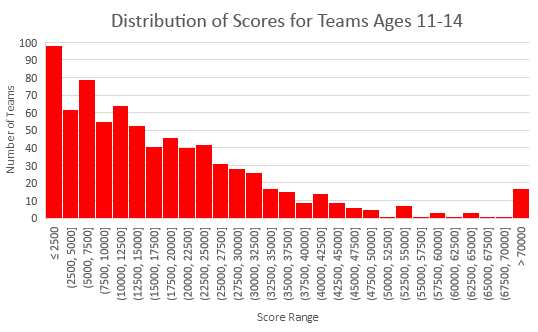
"My favorite part of the challenge was building and engineering the device. Trial and error was really fun because we got to improve our machine until we achieved our goal."
(Team The Juniors, Coppell Middle School East)
| Top Ball Launcher Solution Scores—Ages 11-14 | ||
|---|---|---|
| Team | School/Program | Score |
| Catapultimate | Bay Academy | 134,464 |
| Students of Leonardo da Vinci | Bay Academy | 106,325 |
| The Pencils | St. Clare School | 89,720 |
| Explorers | Swatantra Talim Foundation | 87,480 |
| Razorbacks | West Side Greers Ferry School | 84,250 |
| Srijan | Swatantra Talim Foundation | 77,720 |
| Science Nerds | Bay Academy | 77650 |
| She Wolves | West Side Greers Ferry School | 77,290 |
| DAAD | Chester Hill High School | 76,770 |
| BayGirl | Bay Academy | 76,144 |
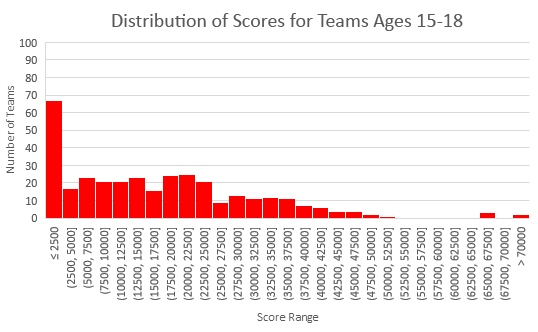
"It was fun to problem solve and find a way to make the ball go as far as possible with using the least amount of points. We also enjoyed building the launcher and testing."
(Team Silicon, Mauldin High School)
| Top Ball Launcher Solution Scores—Ages 15-18 | ||
|---|---|---|
| Team | School/Program | Score |
| Coy and Carlo | Kennedy High School | 83,250 |
| Gorilla Roar | Kempner High School | 66,060 |
| Manon's Project | Riverside High School | 51,351 |
| Chicken Nuggets | Fairchild Wheeler Magnet - Engineering | 49,882 |
| Silicon | Mauldin High School | 48,505 |
| Team Calvin | New Covenant Christian School | 46,614 |
| Sine(P) | Kempner High School | 45,915 |
| Green Machines | De La Salle Santiago Zobel School | 45,380 |
| Ramon Alpha | Ramon Duterte Memorial National High School | 44,514 |
| The Land Urchin | Samueli Academy | 44,420 |
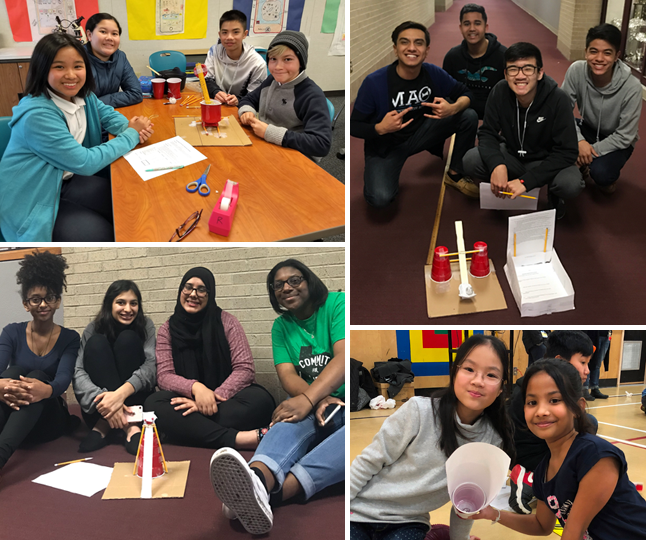
Figure 2. Some of the teams who submitted Ball Launcher solutions for the 2018 Engineering Challenge
Students Embrace the Challenge
Students who entered the 2018 Science Buddies Engineering Challenge had the chance to explore, firsthand, what it means to be an engineer and to collaborate with others to solve a problem and improve a solution. Here are a few examples of what students (and their teachers) told us about their experience doing this year's Ball Launcher challenge:
"My favorite part of the 2018 [Science Buddies] Engineering Challenge was our failures. It was very fun to learn what we could do better and how. I also enjoyed this because our project became better and better after each mistake. Thanks to the Engineering Challenge I have learned how to work out real world situations, communicate, and have a good time during projects such as this." (Team The Mighty Rubber Ducks, Saint John School-Encinitas) |
"Our Favorite part of the 2018 [Science Buddies] Engineering Challenge was drawing up the plans for our design and watching it come to life step by step." (Team LazerShot, Kennedy High School) |
"Creating and building our own design was really good. We don't often get to actually follow the Engineering Design Process all the way and get to test and adapt our designs. We enjoyed trying to get the best score possible." (Team JACE, Goomeri State School) |
"Our favorite part of the 2018 [Science Buddies] Engineering Challenge was gaining teamwork and problem solving skills. In order to make our tinfoil ball travel farther, we had to figure out how to create more tension without the tension making the device collapse. This took problem solving skills and testing. It also took teamwork, because we had to combine and compare our ideas. Gaining these skills helped us to be more successful." (Team Launch Hawks, L.C. Bird High School) |
"My favorite is always watching how teams compromise, work together, and encourage one another to be the best version of themselves. Their favorite part was definitely launching a foil ball across the classroom (even when it didn't go into the catching device)." (Teacher, Highland Park Elementary) |
"I am the 5th grade science teacher at Monarch Elementary School. This challenge came in the middle of our Force and Motion unit and all six of my classes loved participating. I especially enjoyed listening to the conversations that happened between team mates as they processed what they were creating. Thanks for this wonderful opportunity!" (Teacher, Monarch Elementary School) |









